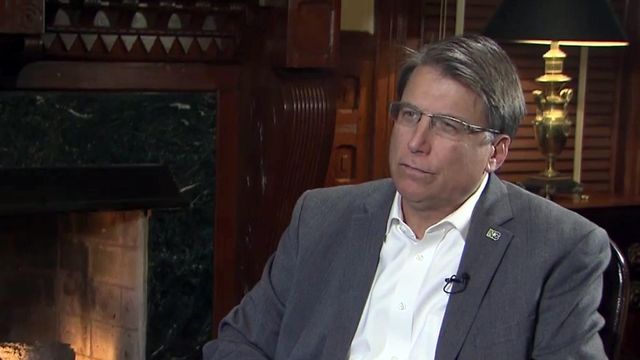McCrory: Political left pushed social issues, not me
Gov. Pat McCrory on Thursday laid the blame for his lost re-election bid at the feet of liberal advocacy groups that gained media attention by highlighting social issues, most notably a controversial state law limiting transgender rights.
Posted — Updated"It's been a four-year battle against radical, left-wing groups," McCrory said in a half-hour interview with WRAL News three days before he leaves office. "There was a coordinated approach to tar me, to stain me, and it never stopped."
While saying he has few regrets from his four years as governor – "A do-over means you assume you'd have different results," he said – he said he does wish he had pressed the Charlotte City Council more early this year not to pass a nondiscrimination ordinance that required businesses in the city to allow transgender individuals to use public bathrooms that correspond with their gender identity.
A month later, state lawmakers quickly adopted House Bill 2, nullifying the Charlotte ordinance while setting a statewide nondiscrimination policy that excluded the LGBT community. The state law created a national firestorm that cost North Carolina business expansions, athletic events, concerts and conventions and made the state the punch line of numerous jokes.
Media became "infatuated" with the gender identity issue, McCrory said, and the Human Rights Campaign, a national LGBT advocacy group, fanned the flames of the controversy.
"They were going to make North Carolina the epicenter of an issue none of us had ever heard of before, and it's a sad commentary that that epicenter continues to remain," he said.
"I think our country ought to protect people from being discriminated against based on sexual orientation, but I also think our national ought to have clear rules on how we define gender – boy and girl," he said. "I think that's the middle ground."
McCrory called lawmakers back to Raleigh last week to repeal House Bill 2 after the Charlotte City Council rescinded its local ordinance, but the effort failed amid frustration and recriminations on both sides of the issue.
"I was going through deja vu," he said, noting he was unsuccessful three times this year trying to broker similar deals. "There's a lot of people on the left that want this issue to keep going. There's a lot of money being raised on it."
Even with House Bill as part of his legacy, the governor said his administration has a laundry list of accomplishments to point to with pride, from cutting taxes to raising teacher pay to building a reserve fund that will help meet emergency needs in the future.
"We're leaving the state in much better shape than when we arrived," he said. "We inherited an economy and a government that was totally broken, that was full of corruption, and we fixed it. We accomplished more in these four years than, I think, any administration has in the last 25 years."
Since conceding the race three weeks ago, McCrory said, he hasn't had time to decide his next career step, although it's been widely speculated that he will land a job in President-elect Donald Trump's administration. He said he's had "wonderful talks" with Trump and counts Vice President-elect Mike Pence as a close friend, but he wants to sit down with his wife, Ann, to discuss their future.
"I have to make sure I feel comfortable in what I want to do next regarding public service," McCrory said, refusing to rule out another political campaign or a return to the private sector. "I just want to fulfill my potential and make a positive difference."
Remaining in politics has its drawbacks, he acknowledged, saying political rhetoric and vitriolic actions by advocates across the spectrum has become increasingly difficult to accept. He recounted how a man approached him as he left a church baptism, made an obscene gesture and spewed a string of expletives at him.
"The coarseness of the dialogue from the outside, I've noticed, has gotten much tougher. It gets to me," he said. "The people who speak of wanting tolerance, I find, tend to be the least tolerant people there are."
• Credits
Copyright 2024 by Capitol Broadcasting Company. All rights reserved. This material may not be published, broadcast, rewritten or redistributed.






